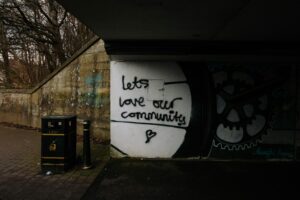Annunciation School Resource Share
Our local community (at Annunciation School in Minneapolis) has recently suffered from a school shooting. We are mourning with this school community and are experiencing an increasing number of parents and local social workers looking for resources. Below is a brief list of helpful resources for those looking to support survivors of this tragedy that we curated.
Resources for Parents, Caregivers and Survivors
- Ana Mcrae and Will Carlson (local MN mental health providers) created this amazing guide (broken down by time since shooting) for Annunciation families
- What Now? A Guide to Navigating First Days and Weeks After the Annunciation Shooting. Prepared by Katie Lingras, PhD, LP, Anne Gearity PhD, LICSW, and Sophia Vinogradov, MD
- City of Minneapolis Resource List
- NAMI Minnesota How to Talk to Kids About Gun Violence Resource Guide
Our suggestions when talking to kids and families who were involved:
DO NOT:
- Ask them for the details of their experience on 8/27/25.

- Tell them how to feel.
- Tell them that they’re lucky to be alive.
- Use language about “God’s will” when it comes to gun violence or safety from it.
- Promise them something you can’t/won’t deliver on.
- Minimize their story or compare it to something else you heard.
- Center your own feelings about the event. Get support from someone else!
- Push them to talk before they’re ready.
DO:
- Listen to those who want to talk about the event and remember that there is no right way to feel.
- Listen more than you speak. Give space for children and families to share their feelings and experiences without rushing to “fix” or explain them away.
- Validate feelings. Say things like “It makes sense you’re feeling scared/angry/sad” instead of trying to push them toward calmness too quickly.
- Use age-appropriate language. Tailor explanations to the child’s developmental level, sticking to simple, clear facts with younger children and more nuanced conversations with older ones.
- Reassure safety without overpromising. Acknowledge that scary things happened and highlight what adults and the community are doing to keep them safe now.
- Encourage expression. Let kids and families know it’s okay to draw, write, cry, ask questions, or even not talk right away.
- Normalize a range of reactions. Emphasize that there is no “right” way to feel—shock, anger, confusion, and sadness are all valid.
- Model calm presence. Children often mirror adult emotions. Even if you’re upset, showing steadiness helps them feel grounded.
- Offer ongoing emotional support. Remind families that healing takes time and that it’s okay to reach out for professional help, peer support groups, or community resources.
- Provide tangible support. It can be very helpful to help out with tasks such as house or yard work, carpooling, or homework.
Thank you to everyone who has reached out in order to learn how to help local families. This should be a step in the right direction; please reach out directly if you are interested in providing more information, resources, etc.
Resources gathered and written by Megan Sigmon-Olsen, MSW, LICSW and the Sentier Psychotherapy clinical team.





